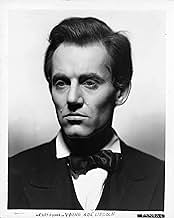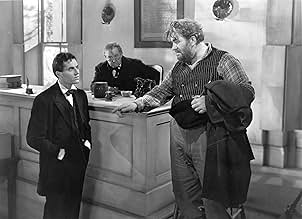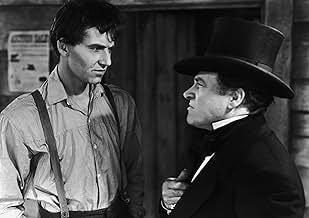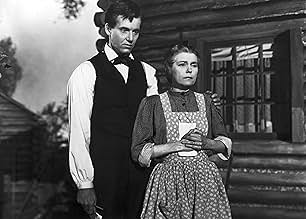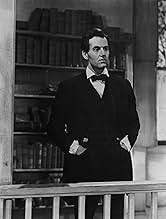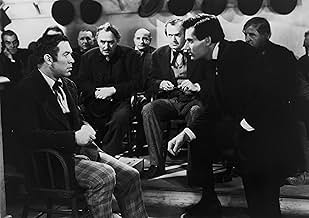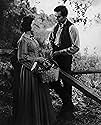A fictionalized account of the early life of the American president as a young lawyer facing his greatest court case.A fictionalized account of the early life of the American president as a young lawyer facing his greatest court case.A fictionalized account of the early life of the American president as a young lawyer facing his greatest court case.
- Nominated for 1 Oscar
- 6 wins & 2 nominations total
- Carrie Sue
- (credit only)
- Man with Lynch Mob
- (uncredited)
- Townsman Dancing at Party
- (uncredited)
- New Salem Townsman
- (uncredited)
- Carrie Sue
- (uncredited)
- Peach Pie Baker
- (uncredited)
- Loafer
- (uncredited)
- Director
- Writers
- All cast & crew
- Production, box office & more at IMDbPro
Featured reviews
The film concerns two young men, brothers, on trial for a murder that both claim to have committed. In classic angry mob style, the town decides to take justice into their own hands and lynch the pair of them, until honest Abe steps into the fray. He charms them with his humor, telling them not to rob him of his first big case, and that they are as good as lynched with him as the boys lawyer. What follows seems to become the outline for all courtroom- murder-dramas thereafter, as Abe cunningly interrogates witnesses to the delight and humor of the judge, jury and town before he stumbles upon the missing links.
The film plays out like many John Ford movies do: a tablespoon of Americana, a dash of moderate predictability, a hint of sarcasm that you aren't sure if you put in the recipe or if Ford did it himself. Despite the overtly 'Hollywood' feel of the film, and overly patriotic banter alluding to Lincoln's future presidency, the film is entirely enjoyable and enjoyably well constructed, if you can take your drama with a grain of salt.
Excellent performance from Henry Fonda as idealistic ,traveller Springfield solicitor , he was to star regularly for John Ford from this movie , as ¨Grapes of wrath" ,"My darling Clementine" , and "Fort Apache¨. Besides, sterling acting by Alice Brady as grieved mother , she was a great actress from the silent cinema to early sound , but this one resulted to be her last movie because she early died due to cancer . The Lincoln's deeds developing make for skillfully appealing entertainment. His portrayal shows a nostalgic longing for things past and old values and describes his goodness , uprightness and willful . Lincoln , like John Ford, was a straightforward man who never varied the ideals of his youth . This American masterpiece is correct on both counts , as splendid biography and as magnificent drama.
Other biographies about Abraham Lincoln are the following ones : 1) ¨Abraham Lincoln¨(1930) by D. W. Griffith with Walter Huston , Una Merkel, talking about his birth until his assassination ; 2) ¨Abe Lincoln in Illinois¨(1940) by John Cromwell with Raymond Massey , Ruth Gordon, concerning similar events to Ford's film throughout his career as a lawyer 3) TV version titled ¨Gore Vidal's Lincoln¨ with Sam Waterston and Mary Tyler Moore as Mary Todd. And, finally, a recent version by Steven Spileberg with Daniel Day Lewis and Sally Field.
Patriototic motion picture that is one of my favorite films from John Ford. Henry Fonda is perfect in the role of the young Abraham Lincoln. In fact, he bears a little resemblence to the late admired and revered, Abraham Lincoln. Fonda gives a performance of admiring humaine tenderness. Many of the scenes in Young Mr Lincoln(1939) are done with beauty and finesse.
With the world plunging into a war that America dreaded, but knew it would be drawn into, Abraham Lincoln was much on people's minds, in 1939, as someone who had faced the same dilemma in his own life, and had triumphed. On Broadway, Robert E. Sherwood's award-winning "Abe Lincoln in Illinois", with Raymond Massey's physically dead-on portrayal, was playing to packed houses (it would be filmed in 1940). Carl Sandburg's continuation of his epic biography, "Abraham Lincoln: The War Years", was published, and quickly became a best seller. President Roosevelt frequently referred to Lincoln in speeches, and the Lincoln Memorial, in Washington, D.C., became the most popular landmark in town (a fact that Frank Capra made good use of, in "Mr. Smith Goes to Washington").
All this was not lost on Darryl F. Zanuck, at 20th Century Fox; as soon as he read Lamar Trotti's screenplay of Lincoln's early days as a lawyer, he designated it a 'prestige' production, and assigned John Ford to direct, and Henry Fonda, to star.
Fonda did NOT want to play Lincoln; he felt he couldn't do justice to the 'Great Emancipator', and feared a bad performance would damage his career. Even a filmed make-up test, in which he was stunned by how much he would resemble Lincoln, wouldn't change his mind. According to Fonda, John Ford, whom he'd never worked with, cussed him out royally, at their first meeting, and explained he wasn't portraying the Lincoln of Legend, but a young "jackanape" country lawyer facing his first murder trial. Humbled, Fonda took the role. (John Ford offered a different scenario of the events, but the outcome was the same!) Obviously, they found a chemistry together that worked, as nearly all of their pairings would produce 'classics'.
Unlike the introverted, melancholia-racked Lincoln of "Abe Lincoln in Illinois", Ford's vision was that of a shy but likable young attorney, who made friends easily, and misses the mother he lost, too young (resulting in a bond with a pioneer mother that becomes a vital part of the story). Injustice riles him, and he speaks 'common sense' to quell violence, interlaced with doses of humor. Both productions play on Lincoln's (undocumented) relationship with Ann Rutledge; in Ford's version, the pair are truly in love, and committed to each other. After her death, Lincoln would frequently visit her grave, to share his life with her 'spirit' (a theme Ford would continue in "She Wore a Yellow Ribbon").
A murder trial is the centerpiece of the film, and shows the prodigious talents of the star and director. Fonda deftly portrays Lincoln's inexperience, yet earnest belief in justice tempered with mercy, and Ford emphasizes the gulf between the big-city 'intellectuals' (represented by pompous D.A. Donald Meek, and his slick 'advisor', Stephen Douglas, played by a young Milburn Stone), and the informal, rule-bending country sense of Lincoln. With Ford 'regular' Ward Bond as a key witness, the trial is both unconventional, and riveting.
With the film closing as Lincoln strides away into the stormy distance, and his destiny (dissolving into a view of the statue at the Lincoln Memorial), audiences could take comfort in the film's message that if a cause is just, good would ultimately triumph.
"Young Mr. Lincoln" is a truly remarkable film, from an amazing year!
Did you know
- TriviaJohn Ford and producer Darryl F. Zanuck fought an extended battle over control of the film. Ford even had unused takes of the film destroyed so the studio could not insert them into the movie. One scene that Ford insisted on cutting was a scene where Lincoln met his future assassin, a very young John Wilkes Booth.
- GoofsLincoln is shown playing "Dixie" on a Jew's harp. That portion of the film is ostensibly set in the year 1837, but most reliable sources indicate that "Dixie" wasn't written, publicly performed nor published before 1859. During the Civil War, Lincoln was known to be partial to the tune (it was almost as popular in the North in the 1860s as in the South), but it's unlikely he would have heard it in the 1830s.
- Quotes
Abe Lincoln: [cross-examining Cass] J. Palmer Cass.
John Palmer Cass: Yes, sir.
Abe Lincoln: What's the "J" stand for?
John Palmer Cass: John.
Abe Lincoln: Anyone ever call you Jack?
John Palmer Cass: Yeah, but...
Abe Lincoln: Why "J. Palmer Cass?" Why not "John P. Cass?"
John Palmer Cass: Well, I...
Abe Lincoln: Does "J. Palmer Cass" have something to hide?
John Palmer Cass: No.
Abe Lincoln: Then what do you part your name in the middle for?
John Palmer Cass: I got a right to call myself anything I want as long as it's my own name!
Abe Lincoln: Well then if it's all the same to you, I'll call you Jack-cass.
[Roar of laughter from spectators]
- ConnectionsFeatured in L'oiseau bleu (1940)
- SoundtracksThe Battle Cry of Freedom
(1862) (uncredited)
Written by George Frederick Root
Played during the opening credits and sung by an unidentified chorus
Details
- Release date
- Country of origin
- Language
- Also known as
- Young Mr. Lincoln
- Filming locations
- Sacramento, California, USA(river scenes)
- Production companies
- See more company credits at IMDbPro
Box office
- Budget
- $1,500,000 (estimated)
- Runtime
- 1h 40m(100 min)
- Color
- Aspect ratio
- 1.37 : 1

